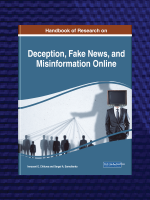 | | Handbook of Research on Deception, Fake News, and Misinformation Online |
Profs. Innocent E. Chiluwa (Covenant University, Nigeria) and Sergei A. Samoilenko (George Mason University, USA)
©2019 | 651 pgs. | EISBN: 9781522585374
| - Latest Research Findings of 40+ Researchers from Over Five
(5+) Countries - Features 25+ Chapters on the Latest, Peer-Reviewed Research
- Covers Topics such as Cyber Fraud, Social Media, & Propaganda
- Suitable for Academicians, Students, Media Specialists, & Communication Professionals
- Excellent Addition to Your Institution’s Library
|
| |
|
|
Recently, the
Federal Bureau of Investigation (FBI) sent out a public service announcement warning about the rising trend in a romance cryptocurrency scam with more than 1,800 complaints and US$ 120,000 million being lost in 2021 alone. These scams are conducted by con artists utilizing dating applications and/or social media to build an online relationship with their victims. From there, they will convince them to invest money in cryptocurrency. Once convinced, they will send their victims to a fake website to capture their personal information and banking numbers and will continually extort money from them.
According to the
United States Federal Trade Commission (FTC), these sham romances have been on the rise, with a 50% increase in these scams since 2019. They also report that the pandemic is providing the ideal guise for these scammers, as they can avoid meeting their “romantic connections” in person due to fears of COVID-19. Although this scam is inspired by many of the well-known internet scams, like the Nigerian Prince, experts state that this can be more difficult to identify due to the personalization of the tactics utilized in this extortion.
Understanding these scams are on the rise, Profs. Renee D. Lamphere and Kweilin T. Lucas, from the University of North Carolina at Greensboro, USA, discuss variations of “romance scams,” the motivations of these scammers, and the ultimate results of this victimization, in their chapter, “
Online Romance in the 21st Century: Deceptive Online Dating, Catfishing, Romance Scams, and “Mail Order” Marriages,” featured in the
Handbook of Research on Deception, Fake News, and Misinformation Online (IGI Global).
| View a Preview of the Open Access Article Below |
|
The rapid development of Internet-based technologies has changed many aspects of our lives. One area of human communication that has been affected by technological advances is the opportunity for online romantic endeavors. The Internet has now made it possible for a person to date without ever leaving their home. The use of Internet dating sites, social networking sites, and dating applications has enabled humans to date 24 hours a day, 7 days a week, 365 days a year (Rege, 2009). It is estimated that one in four dating relationships begin online, making the Internet the second most common way that dating couples meet (Cocalis, 2016).
With the increase in popularity of online dating in the past twenty years has come a growth in both the numbers and revenues of online dating websites (Close & Zinkhan, 2004). There are over 1,400 dating sites in North America alone (Rege, 2009), which are estimated to generate $2 to $4 billion in revenue annually (Hamm, 2014; Harwell, 2015; Rogers, 2013). Popular sites such as Match.com, eHarmony.com, Chemistry.com, OurTime.com, and OKCupid.com make it easy for individuals to meet potential online matches (Harwell, 2015; Rege, 2009). Online dating sites provide an avenue to meet people online with the potential to move offline into face-to-face relationships (Barraket & Henry-Waring, 2008). In addition to traditional websites, there are also several popular online dating applications. Popular apps such as Tinder, Coffee Meet Bagel, and Zoosk that users download on their phones make it easy to browse for potential mates (Windelman, 2018). Online dating is not limited to dating sites and apps only; social networking sites such as Facebook, Instagram, Snapchat, and Twitter have generated a new method of connecting with others who may share similar interests (Wortham, 2014). It is through this new method of social networking that a new type of dating scam has emerged known as “catfishing”. Catfishing is the verb used to describe the actions of a “catfish”, a person who creates falsified online profiles on social networking sites with the purpose of fraudulently seducing someone (Harris, 2013).
Recent research by Smith (2016) in conjunction with the Pew Research Internet Project echoes the trend towards online dating, with 12% of Americans reporting using online dating sites or mobile dating applications. This represented a 3% increase from the 9% who reported usage in 2013 (Smith & Duggan, 2013). In regard to social networking sites (SNS), 31% of respondents reported using these sites to check up on someone they used to date or be in a relationship with, and 15% asked someone out on a date using an SNS (Smith & Duggan, 2013). While the majority of people who go online to date do not experience major difficulties, it is an industry that has faced a number of problems, particularly the emergence of dating/romance scams (Button, McNaughton-Nicholls, Kerr, & Owen, 2014; Rege, 2009). This has left many online dating users weary of dating on the Internet, with 45% of adult online dating users agreeing that it is more dangerous than other ways of meeting people (Smith, 2016).
In addition to the “traditional” online dating/romance scams, the emergence of catfishing has brought about a new and different type of online dating victimization for online daters to be wary of. Also, something to consider is that the increase in the use of online dating is also correlated with increases in the use of the Internet for finding marriages. One particular practice, the use of mail order brides in the United States, will be explored in detail in this chapter. It is important to understand the difference between these types of online dating victimization, as the motivation of the scammer and the potential for victimization varies greatly depending on the type of scam a person falls victim to.
Complimentary Research Articles and Chapters on
Cybercrime, Digital Security, & Financial Crime | | Encyclopedia of Criminal Activities and the Deep Web
(3 Volumes) | Mehdi Khosrow-Pour D.B.A
©2020 | 1,162 pgs. | EISBN: 9781522597162 | - Features Three (3) Volumes with Over 75+ Chapters of
Peer-Reviewed Research - Offering the Latest Research Findings from 175+ Scholars in Over 15+ Countries
- Covers Topics such as Blockchain, Cyber
Espionage, & Hacktivism - Excellent Addition to Your Institution’s Library
|
|
| |
| |
|
| | | | Ethical Hacking Techniques and Countermeasures for Cybercrime Prevention | Prof. Nabie Y. Conteh (Southern University at New Orleans, USA)
©2021 | 168 pgs. | EISBN: 9781799865063 | - Features 10+ Chapters on the Latest, Peer-Reviewed Research
- Covers Topics such as Authentication, Cyber Investigations, & Data Security
- Ideal Resource for Cybersecurity Analysts, Government
Officials, & Researchers - Excellent Addition to Your Institution’s Library
|
|
| |
| |
|
| | | | Handbook of Research on Cyber Crime and Information Privacy (2 Volumes) | Profs. Maria Manuela Cruz-Cunha (Polytechnic Institute of Cávado and Ave, Portugal) and Nuno Ricardo Mateus-Coelho (Polytechnic Institute of Management and Technology, Portugal)
©2021 | 753 pgs. | EISBN: 9781799857297 | - Edited by Leading Researchers in Systems &
Informatics Engineering - Features Two (2) Volumes with Over 30+ Chapters of
Peer-Reviewed Research - Covers Topics Such as Social Networks, Phishing, & Spyware
- Excellent Addition to Your Institution’s Library
|
|
| |
| |
|
| | | | The Strategies of Informing Technology in the 21st Century | Prof. Andrew Targowski (Independent Researcher, USA)
©2022 | 557 pgs. | EISBN: 9781799880387 | - Authored by Expert in Information Security for Over 40+ Years
- Features Over 20+ Chapters of Peer-Reviewed Research
- Ideal Resource for IT Executives, CIS/MIS/CS Faculty, &
Security Analysts - Covers Topics such as Digital Ethics, Security, &
Artificial Intelligence
|
|
| |
| |
|
| | | View All Chapters and Articles on This Topic | | The “View All Chapters and Articles on This Topic” navigates to IGI Global’s Demo Account, which provides a sample of the IGI Global content available through IGI Global’s e-Book Collection (6,600+ e-books) and e-Journal Collection (140+ e-journals) databases. If interested in having full access to this peer-reviewed research content,
Recommend These Valuable Research Tools to Your Library |
|

For Journalists Interested in Additional Trending Research
Contact IGI Global’s Marketing Team at marketing@igi-global.com or 717-533-8845 ext. 100 to access additional peer-reviewed resources to integrate into your latest news stories.
About IGI Global
Founded in 1988, IGI Global, an international academic publisher, is committed to producing the highest quality research (as an active full member of the Committee on Publication Ethics “COPE”) and ensuring the timely dissemination of innovative research findings through an expeditious and technologically advanced publishing process. Through their commitment to supporting the research community ahead of profitability, and taking a chance on virtually untapped topic coverage, IGI Global has been able to collaborate with over 150,000+ researchers from some of the most prominent research institutions around the world to publish the most emerging, peer-reviewed research across 350+ topics in 11 subject areas including business, computer science, education, engineering, social sciences, and more. To learn more about IGI Global, click here.
Newsroom Contact
Caroline Campbell
Assistant Director of Marketing and Sales
(717) 533-8845, ext. 144
ccampbell@igi-global.com
www.igi-global.com